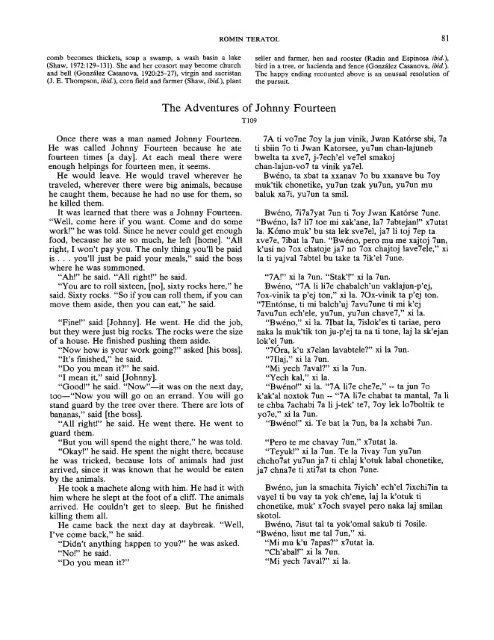PDF (Lo-Res) - Smithsonian Institution Libraries
PDF (Lo-Res) - Smithsonian Institution Libraries
PDF (Lo-Res) - Smithsonian Institution Libraries
You also want an ePaper? Increase the reach of your titles
YUMPU automatically turns print PDFs into web optimized ePapers that Google loves.
comb becomes thickets, soap a swamp, a wash basin a lake<br />
(Shaw, 1972:129-131). She and her consort may become church<br />
and bell (Gonzalez Casanova, 1920:25-27), virgin and sacristan<br />
(J. E. Thompson, ibid.), corn field and farmer (Shaw, ibid.), plant<br />
Once there was a man named Johnny Fourteen.<br />
He was called Johnny Fourteen because he ate<br />
fourteen times [a day]. At each meal there were<br />
enough helpings for fourteen men, it seems.<br />
He would leave. He would travel wherever he<br />
traveled, wherever there were big animals, because<br />
he caught them, because he had no use for them, so<br />
he killed them.<br />
It was learned that there was a Johnny Fourteen.<br />
"Well, come here if you want. Come and do some<br />
work!" he was told. Since he never could get enough<br />
food, because he ate so much, he left [home]. "All<br />
right, I won't pay you. The only thing you'll be paid<br />
is ... you'll just be paid your meals," said the boss<br />
where he was summoned.<br />
"Ah!" he said. "All right!" he said.<br />
"You are to roll sixteen, [no], sixty rocks here," he<br />
said. Sixty rocks. "So if you can roll them, if you can<br />
move them aside, then you can eat," he said.<br />
"Fine!" said [Johnny]. He went. He did the job,<br />
but they were just big rocks. The rocks were the size<br />
of a house. He finished pushing them aside.<br />
"Now how is your work going?" asked [his boss].<br />
"It's finished," he said.<br />
"Do you mean it?" he said.<br />
"I mean it," said [Johnny].<br />
"Good!" he said. "Now"—it was on the next day,<br />
too—"Now you will go on an errand. You will go<br />
stand guard by the tree over there. There are lots of<br />
bananas," said [the boss].<br />
"All right!" he said. He went there. He went to<br />
guard them.<br />
"But you will spend the night there," he was told.<br />
"Okay!" he said. He spent the night there, because<br />
he was tricked, because lots of animals had just<br />
arrived, since it was known that he would be eaten<br />
by the animals.<br />
He took a machete along with him. He had it with<br />
him where he slept at the foot of a cliff. The animals<br />
arrived. He couldn't get to sleep. But he finished<br />
killing them all.<br />
He came back the next day at daybreak. "Well,<br />
I've come back," he said.<br />
"Didn't anything happen to you?" he was asked.<br />
"No!" he said.<br />
"Do you mean it?"<br />
ROMIN TERATOL<br />
The Adventures of Johnny Fourteen<br />
T109<br />
seller and farmer, hen and rooster (Radin and Espinosa ibid.),<br />
bird in a tree, or hacienda and fence (Gonzalez Casanova, ibid.).<br />
The happy ending recounted above is an unusual resolution of<br />
the pursuit.<br />
7A ti vo7ne 7oy la jun vinik, Jwan Katorse sbi, 7a<br />
ti sbiin 7o ti Jwan Katorsee, yu7un chan-lajuneb<br />
bwelta ta xve7, j-7ech'el ve7el smakoj<br />
chan-lajun-vo7 ta vinik ya7el.<br />
Bweno, ta xbat ta xxanav 7o bu xxanave bu 7oy<br />
muk'tik chonetike, yu7un tzak yu7un, yu7un mu<br />
baluk xa7i, yu7un ta smil.<br />
Bweno, 7i7a7yat 7un ti 7oy Jwan Katorse 7une.<br />
"Bweno, Ia7 Ii7 toe mi xak'ane, Ia7 7abtejan!" x7utat<br />
la. Komo muk' bu sta lek sve7el, ja7 li toj 7ep ta<br />
xve7e, 7ibat la 7un. "Bweno, pero mu me xajtoj 7un,<br />
k'usi no 7ox chatoje ja7 no 7ox chajtoj Iave7ele," xi<br />
la ti yajval 7abtel bu take ta 7ik'el 7une.<br />
"7A!" xi la 7un. "Stak'!" xi la 7un.<br />
Bweno, "7A li Ii7e chabalch'un vaklajun-p'ej,<br />
7ox-vinik ta p'ej ton," xi la. 7Ox-vinik ta p'ej ton.<br />
"7Entonse, ti mi balch'uj 7avu7une ti mi k'ej<br />
7avu7un ech'ele, yu7un, yu7un chave7," xi la.<br />
"Bweno," xi la. 7Ibat la, 7islok'es ti tariae, pero<br />
naka la muk'tik ton ju-p'ej ta na ti tone, laj la sk'ejan<br />
lok'el 7un.<br />
"7Ora, k'u x7elan lavabtele?" xi la 7un.<br />
"7Ilaj," xi la 7un.<br />
"Mi yech 7aval?" xi la 7un.<br />
"Yech kal," xi la.<br />
"Bweno!" xi la. "7A Ii7e che7e," - ta jun 7o<br />
k'ak'al noxtok 7un -- "7A H7e chabat ta mantal, 7a li<br />
te chba 7achabi 7a li j-tek' te7, 7oy lek Io7boltik te<br />
yo7e," xi la 7un.<br />
"Bweno!" xi. Te bat la 7un, ba la xchabi 7un.<br />
"Pero te me chavay 7un," x7utat la.<br />
"Teyuk!" xi la 7un. Te la 7ivay 7un yu7un<br />
chcho7at yu7un ja7 ti chlaj k'otuk labal chonetike,<br />
ja7 chna7e ti xti7at ta chon 7une.<br />
Bweno, jun la smachita 7iyich' ech'el 7ixchi7in ta<br />
vayel ti bu vay ta yok ch'ene, laj la k'otuk ti<br />
chonetike, muk' x7och svayel pero naka laj smilan<br />
skotol.<br />
Bweno, 7isut tal ta yok'omal sakub ti 7osile.<br />
"Bweno, lisut me tal 7un," xi.<br />
"Mi mu k'u 7apas?" x7utat la.<br />
"Ch'abal!" xi la 7un.<br />
"Mi yech 7aval?" xi la.<br />
81

















